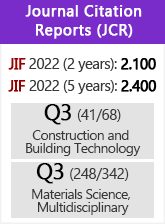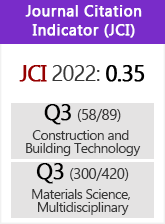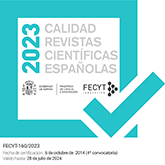Comportamiento de morteros de cementos alcalinos reforzados con fibras acrílicas y de polipropileno
DOI:
https://doi.org/10.3989/mc.2000.v50.i259.400Resumen
En el presente trabajo se estudia el comportamiento de morteros de cementos alcalinos reforzados con fibras de distinta naturaleza (acrílica y de polipropileno). Se ha evaluado también la estabilidad química de dichas fibras en medios fuertemente alcalinos. Se han utilizado tres matrices diferentes: escoria vítrea de horno alto activada con NaOH 2M, temperatura ambiente (22ºC); ceniza volante activada con NaOH 8M, curada a 85ºC durante 24 horas y 50%ceniza/50%escoria activada con NaOH 8M, temperatura ambiente. El contenido de fibra fue del 0,2 y 1% en volumen de mortero. Los ensayos realizados fueron: tenacidad e índice de tenacidad, resistencia al impacto y retracción al secado. Sobre las probetas ensayadas a impacto se realizó un estudio microestructural por SEM/EDX. Los resultados obtenidos han demostrado que: a) Las fibras acrílicas y de polipropileno son estables en medios fuertemente básicos, aunque las primeras experimentan procesos de hidrólisis/hidratación que se manifiesta con alteración de su textura superficial, b) Con bajos contenidos en fibra (0,2% en volumen), la tenacidad y el índice de tenacidad de estos morteros no se ve afectado. Con contenidos superiores (1%) se produce un incremento en los correspondientes valores. Este incremento es mayor en los morteros de escoria activada alcalinamente, c) Para las tres matrices estudiadas, las fibras de polipropileno incrementan la resistencia al impacto en mayor medida que las fibras acrílicas. El efecto de refuerzo es más significativo en la matriz que contiene escorias y cuando el contenido de fibra es del 1% en volumen, d) La retracción al secado de estos morteros se modifica dependiendo del tipo de matriz y fibra. En los morteros de escoria activada, las fibras no reducen la retracción. En los morteros de ceniza activada reforzados con las fibras acrílicas, la retracción es menor que cuando contienen fibras de polipropileno o carecen de ellas. Finalmente, en los morteros de ceniza/escoria activada, las dos fibras reducen la retracción al secado.
Descargas
Los datos de descargas todavía no están disponibles.
Descargas
Publicado
2000-09-30
Cómo citar
Puertas, F., Amat, T., & Vázquez, T. (2000). Comportamiento de morteros de cementos alcalinos reforzados con fibras acrílicas y de polipropileno. Materiales De Construcción, 50(259), 69–84. https://doi.org/10.3989/mc.2000.v50.i259.400
Número
Sección
Artículos
Licencia
Derechos de autor 2000 Consejo Superior de Investigaciones Científicas (CSIC)

Esta obra está bajo una licencia internacional Creative Commons Atribución 4.0.
© CSIC. Los originales publicados en las ediciones impresa y electrónica de esta Revista son propiedad del Consejo Superior de Investigaciones Científicas, siendo necesario citar la procedencia en cualquier reproducción parcial o total.Salvo indicación contraria, todos los contenidos de la edición electrónica se distribuyen bajo una licencia de uso y distribución “Creative Commons Reconocimiento 4.0 Internacional ” (CC BY 4.0). Puede consultar desde aquí la versión informativa y el texto legal de la licencia. Esta circunstancia ha de hacerse constar expresamente de esta forma cuando sea necesario.
No se autoriza el depósito en repositorios, páginas web personales o similares de cualquier otra versión distinta a la publicada por el editor.

















